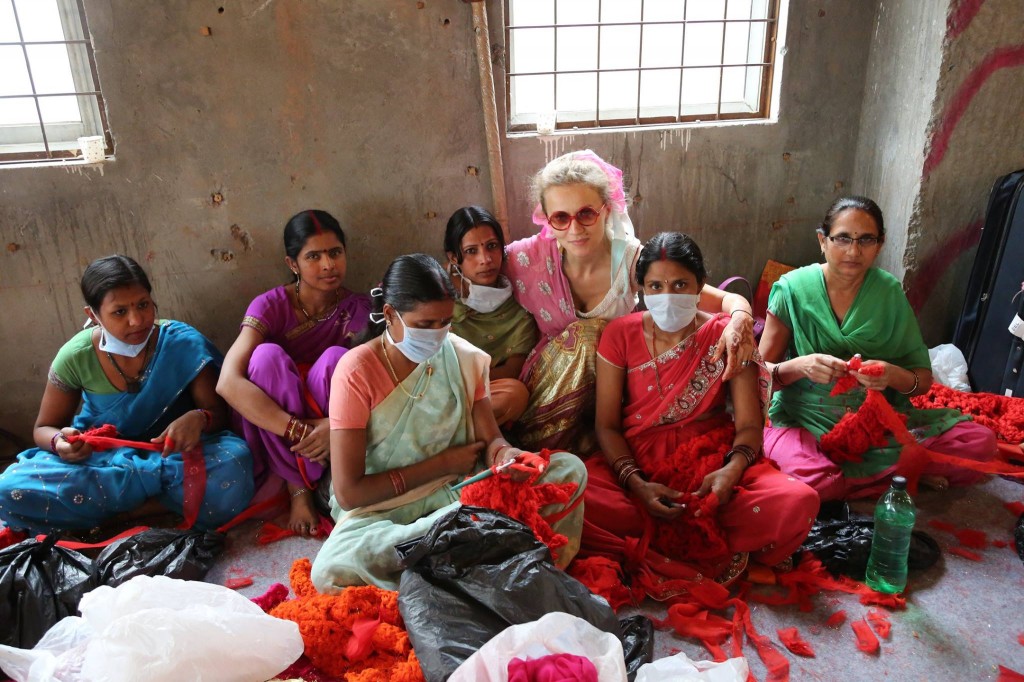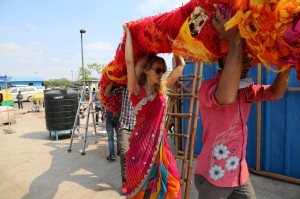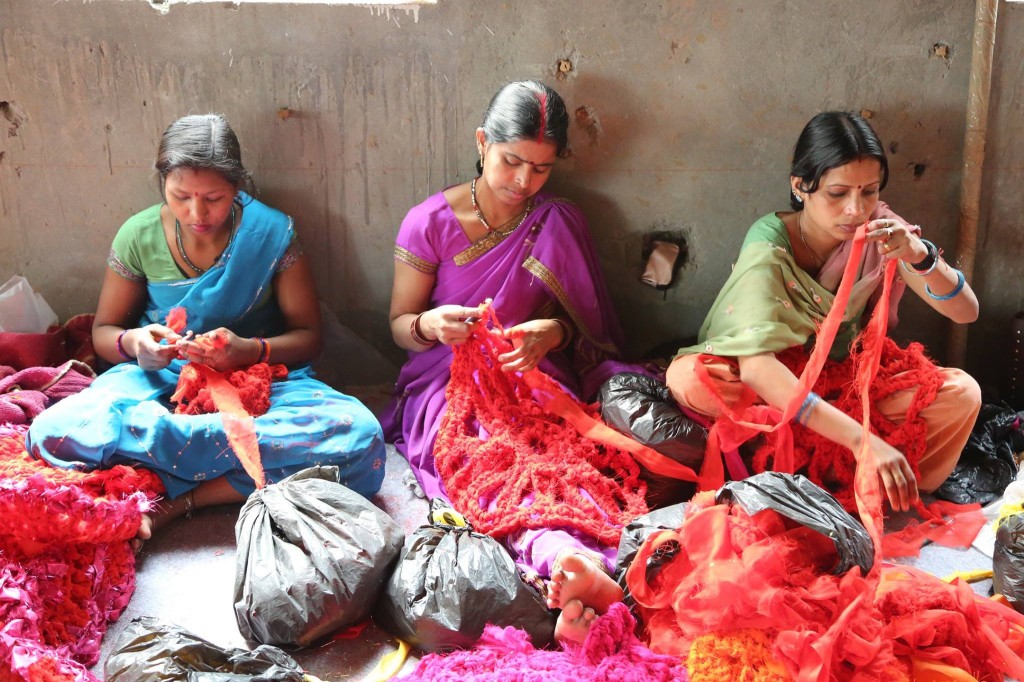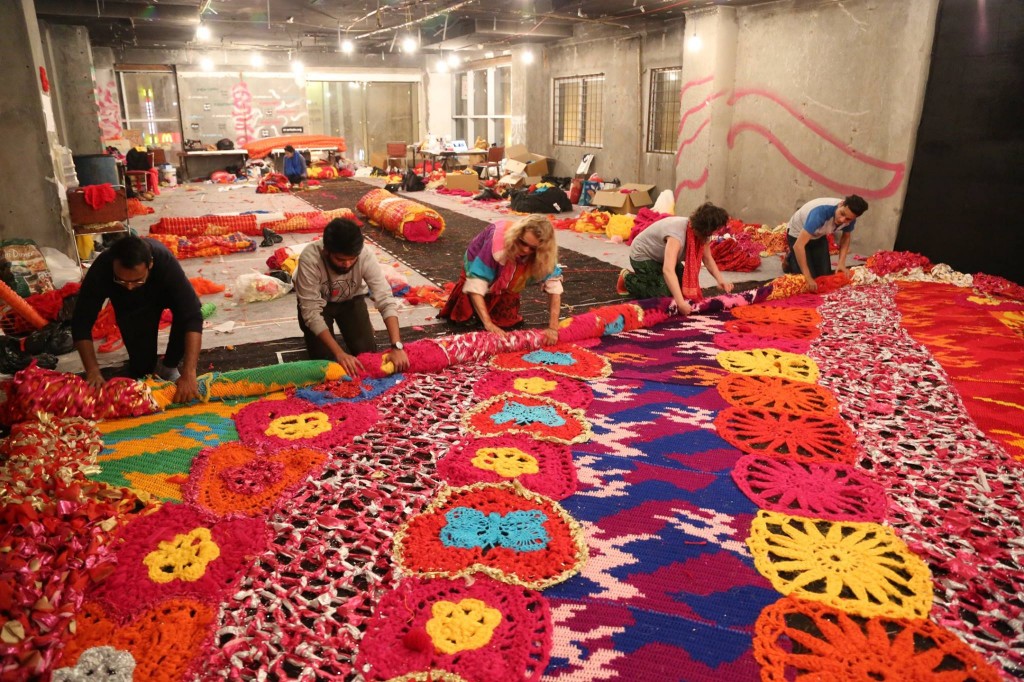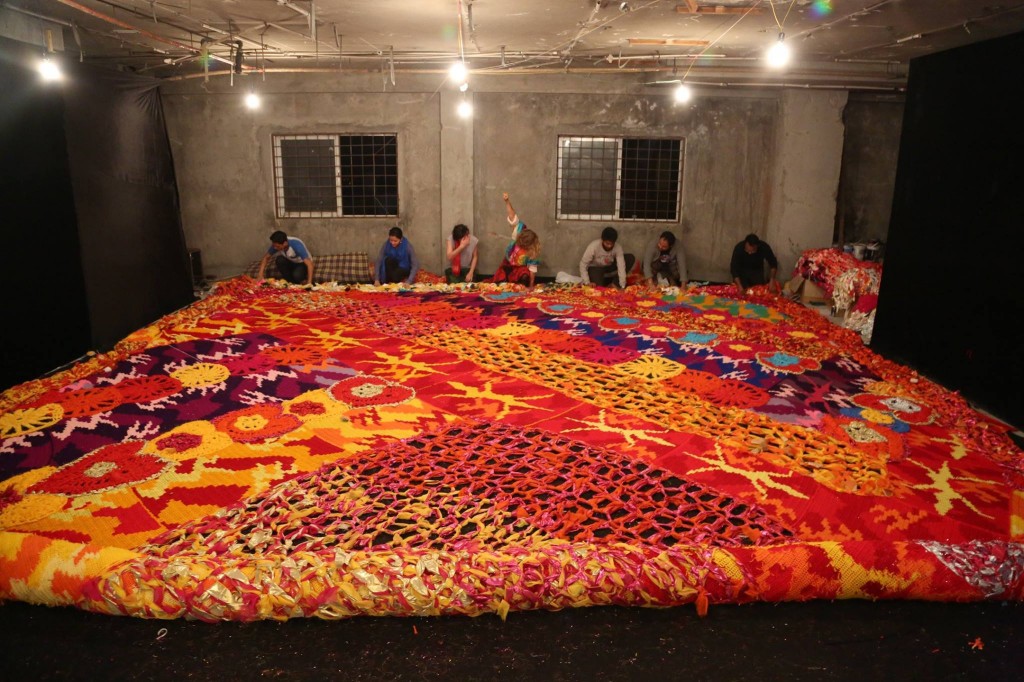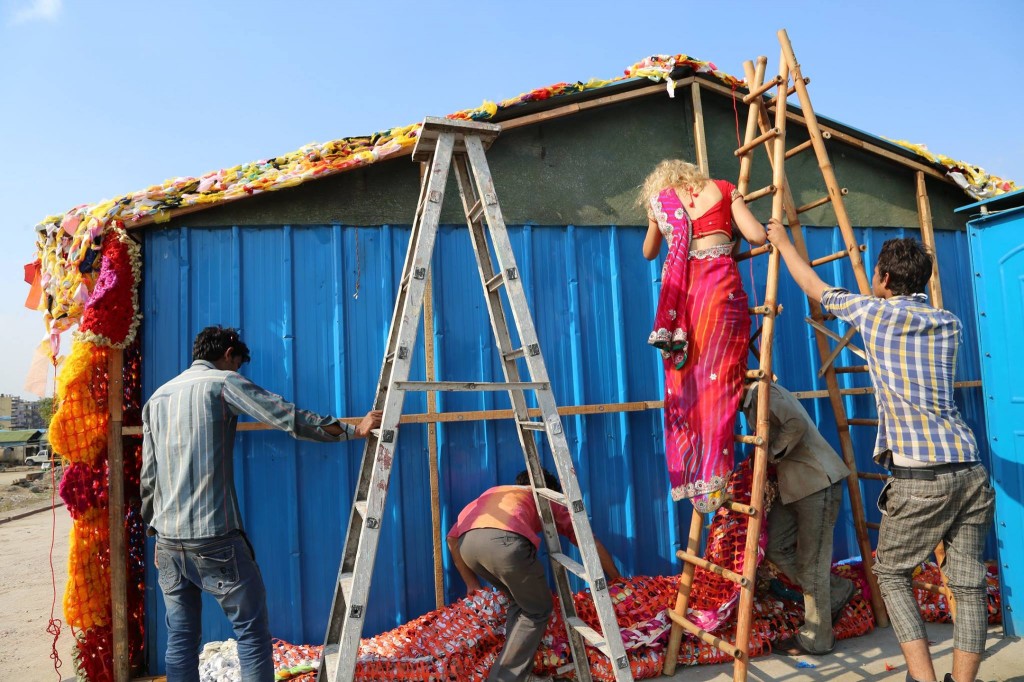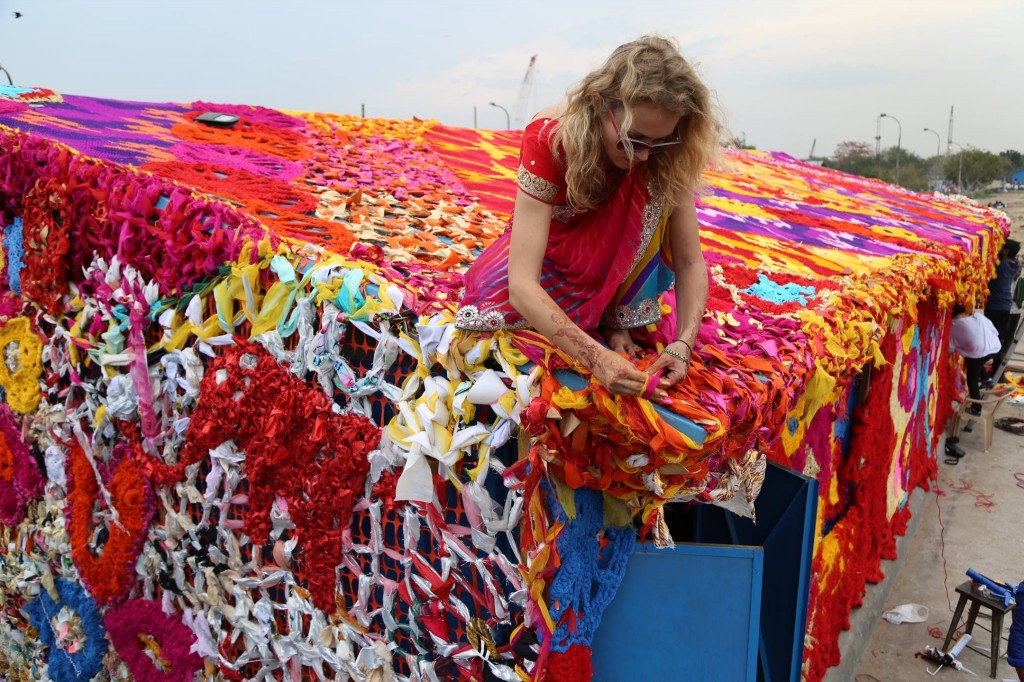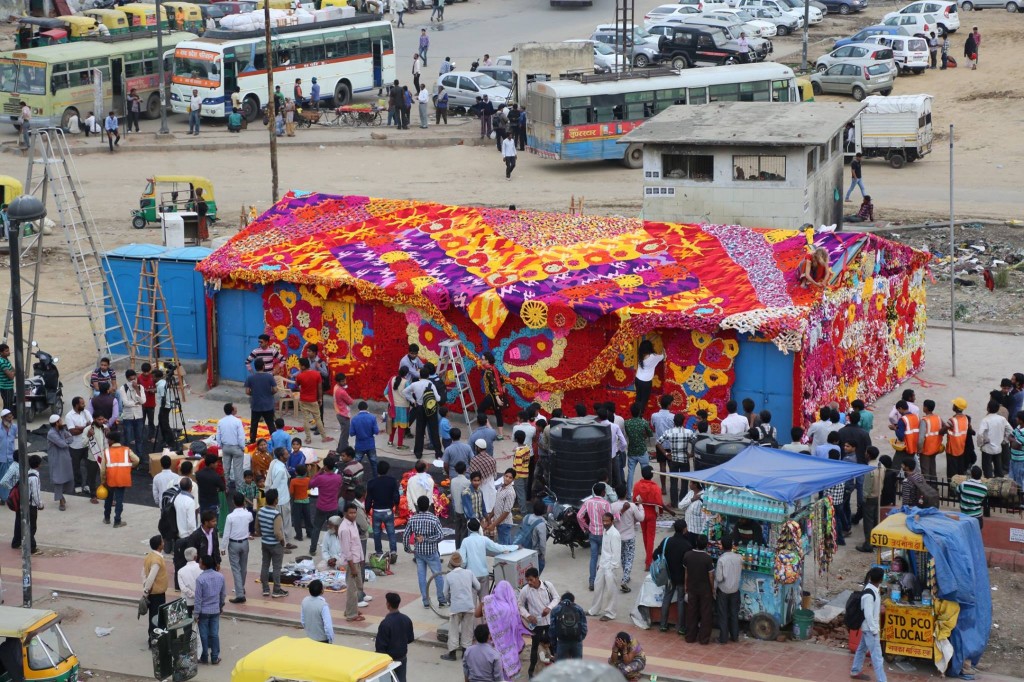“I delivered an oversized baby with no painkillers”
Polish artist, Agata Oleksiak, also known as Olek, uses bright colored crochet artworks as installations in cities to highlight political and cultural issues. Recently, Olek was in Delhi as a part of the St+art Festival, decorating a homeless shelter with her crochet installation. Local women assisted Olek to create a 40ft x 30 ft yarn to bring attention to the night shelter in Sarai Kale Khan in Delhi. Olek, a self-taught crochet artist uses her work to express her support of women’s rights, sexual equality and freedom of expression. WTO Blogger Roma Rajpal Weiß asked her a few questions about her project and experience in India.
What impressions did you bring back from India?
I am totally overwhelmed! There are two different sides of India for me. I spent four weeks working and travelling in the country and I believe I got the full package during my first trip. When you work in a country you actually see how people live, work, eat, and what they do in their everyday lives. The colors, the country, the religion that one sees… But there is also the pollution that is everywhere. I also had the chance to celebrate the festival of colors (Holi) in the city of Pushkar. I had always dreamed of travelling as a backpacker across India since I was teenager and I made this dream come true. But working was quite difficult because people in India have a different work ethics. But I had limited time so I had to work nonstop and really fast.
Tell us about your project in New Delhi.
I was a part of the Street Art Festival in Delhi, and I displayed my crochet work over a night shelter. It was a great project because I don’t want to create art just for museums. I want to create art for people who would never experience art or would never have the chance to go to a gallery.
And a shelter for the homeless in a city is usually pushed away to the suburbs. So, with my art I brightened up this shelter to tell people that the shelters are here and what they are like. I also wanted to do something specific to the Indian culture, when you write an article you have a certain audience in mind, you use words to describe something. So, in the context of India I needed to use a very specific, simple language for my work to talk to the population that lives there. That’s how I am going to touch them and that’s how I am going to reach them or inspire them. So, I used elephants, butterflies and birds as motifs for my work, simple symbols to create a powerful statement.
How was it working alongside the local women in Delhi?
In the beginning it was hard because it was difficult for them to understand the vision of the project. It took them some time to understand what the work stands for and what I was trying to convey. We were very lucky to have women from a factory in Noida, where the factory owner allowed some of his workers to work for the project and even paid for their time. There were other marginalized sections of the society that took part in my project with the help of NGOs.
How did the experience change you?
I would have to write a book about my experience in India! The experience was like: I delivered an oversized baby with no painkillers! I feel that something inside me has changed, but I can’t put down my finger on it. I guess I need some time to process it all.
What do you hope to achieve through your artwork in India?
I use my art to make something visible and in this case the people in the shelter felt very special because they live in a place that everybody forgets. Nobody even bothers to realize that these homeless people even exist and the moment you bring attention to them, the crochet and the press, they are no longer forgotten. I hope to have created some change in some small way. Every change is a process and I hope that the project inspired them to do something special with their lives. I hope that in the next step I can help in some way by setting up a school for the children of the homeless people.
Pictures
“We were very lucky to have women from a factory in Noida, where the factory owner allowed some of his workers to work for the project and even paid for their time.”
“It took them some time to understand what the work stands for and what I was trying to convey.”
“I used elephants, butterflies and birds as motifs for my work, simple symbols to create a powerful statement.”
“I want to create art for people who would never experience art or would never have the chance to go to a gallery.”
“I hope to have created some change in some small way.”
“I hope that in the next step I can help in some way by setting up a school for the children of the homeless people.”
Author: Roma Rajpal Weiß
Editor: Marjory Linardy
Roma Rajpal Weiß is an Indian Blogger and Journalist and can be followed @romarajpal
WTO RECOMMENDS
India’s single women
“What you think, you become… If you think you are weak, then you are. If you think you are strong, then that’s what you become. Women are not empty vessels that someone will fill our lives with empowerment. We have to draw on our inner strength first, as the power to bring change lies within ourselves.”
‘A recognition for neglected children’
Kailash Satyarthi has been awarded the Nobel Peace Prize for his fight against child labor. In an exclusive DW interview, the activist talks about the importance of the prize and plans to work alongside co-winner Malala. For decades, Kailash Satyarthi has dedicated his life to helping millions of children forced into slavery.
India’s women tuk-tuk drivers
If you were to land in Chennai in southern India one of these days, do not be surprised to see sari-clad women with khaki jackets, zipping around the city and ferrying passengers in black-and-yellow tuk-tuks, known as autorickshaws in India.



